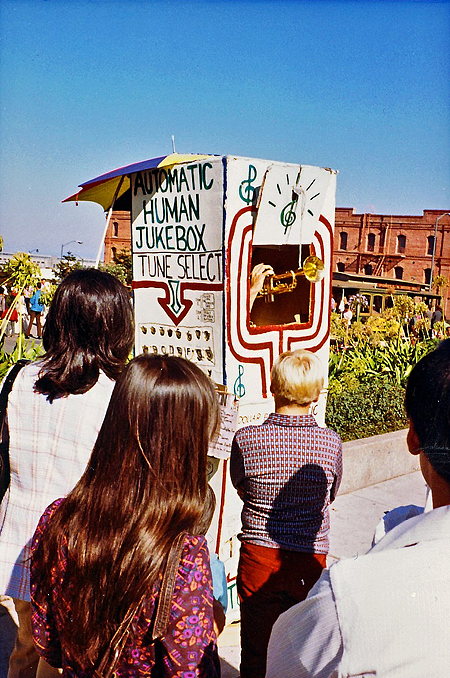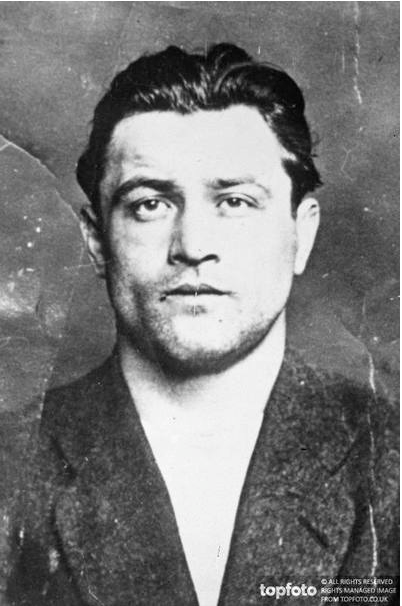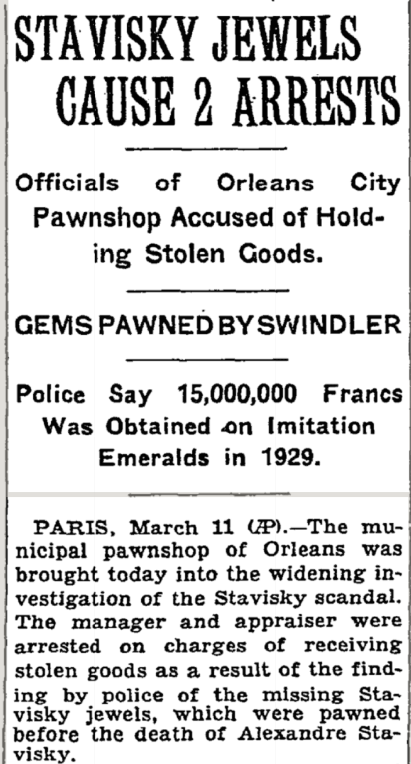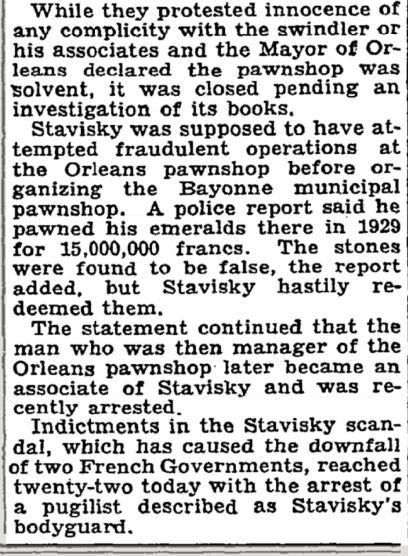Category:
Outsiders, Marginals, the Excluded and Low-castes
Outsiders, Marginals, the Excluded and Low-castes
The Automatic Human Jukebox
For many years, beginning around 1972, Grimes Poznikov entertained crowds at San Francisco's Fisherman's Wharf by transforming himself into the "Automatic Human Jukebox."
source: wikipedia
Some details about him from a 1975 syndicated article by reporter Philip Hager (The Spokane Spokesman-Review - Sep 14, 1975):
Grimes Poznikov is the Automatic Human Jukebox — a statement that somehow renders anything that follows it anticlimatic.
For three years, he has been delighting the throngs of visitors to Fisherman's Wharf and Ghiardelli Square, popping out of a box the size of a telephone booth to offer such selections as "Sentimental Journey," "When the Saints Go Marching In," and, inevitably, "I Left My Heart in San Francisco."
But even as a minor institution in a city with a deserved reputation for unorthodoxy, Grimes Poznikov, the Automatic Human Jukebox, has found himself facing an unceremonious eviction from the streets of San Francisco.
Poznikov's problem is that he has been cited for occupying a public street without a permit, a charge he intends to fight before a jury.
In recent weeks, seeking that elusive permit, he has been turned down by the city's Public Works Department, the Recreation and Parks Department, the Art Commission and, finally, the Board of Permit Appeals.
As a streetcorner jukebox, he doesn't fit into a tidy official category.
"I'm in a gray area, somewhere between a musician and a street artist," he explained. "The Public Works Department pointed out that under their rules I wasn't a building either."
For three years, he has been delighting the throngs of visitors to Fisherman's Wharf and Ghiardelli Square, popping out of a box the size of a telephone booth to offer such selections as "Sentimental Journey," "When the Saints Go Marching In," and, inevitably, "I Left My Heart in San Francisco."
But even as a minor institution in a city with a deserved reputation for unorthodoxy, Grimes Poznikov, the Automatic Human Jukebox, has found himself facing an unceremonious eviction from the streets of San Francisco.
Poznikov's problem is that he has been cited for occupying a public street without a permit, a charge he intends to fight before a jury.
In recent weeks, seeking that elusive permit, he has been turned down by the city's Public Works Department, the Recreation and Parks Department, the Art Commission and, finally, the Board of Permit Appeals.
As a streetcorner jukebox, he doesn't fit into a tidy official category.
"I'm in a gray area, somewhere between a musician and a street artist," he explained. "The Public Works Department pointed out that under their rules I wasn't a building either."
The concept of the Automatic Human Jukebox occurred to him in the early '70s when he read of a poll listing "jukeboxes" as one of the things Europeans liked most about America.
During the height of the tourist season, Poznikov almost every day erects his seven-foot-high jukebox on the corner of Beach and Larkin, using a wire cord to anchor the structure to a nearby maple tree.
Passersby are invited to make a selection from a list of tunes Poznikov has mastered and drop in a coin. ("AHJ practices no economic discrimination," a sign announces. "However, quality... will vary automatically with the quantity of coins inserted.")
During the height of the tourist season, Poznikov almost every day erects his seven-foot-high jukebox on the corner of Beach and Larkin, using a wire cord to anchor the structure to a nearby maple tree.
Passersby are invited to make a selection from a list of tunes Poznikov has mastered and drop in a coin. ("AHJ practices no economic discrimination," a sign announces. "However, quality... will vary automatically with the quantity of coins inserted.")
Few of them realize it, but Poznikov has been peering right back at the crowds who peer in at him. He occasionally takes their photographs and, as a student of psychology, he has written a scholarly paper entitled "Deinstitutionalization of Psychotherapy Through Mass Psychotherepeutic Implementation — Automatic Human Jukebox, a Case in Point."
In his paper Poznikov has recorded his observations of his customers during what he calls three years worth of "ongoing demonstration of mass psychotherepeutic implementation," noting such details as "... a five to 35 second raucous laughter follows most AJH actuations."
Passersby, he has written, first refer to the jukebox in "non-personified pronoun terms" ("it") then, upon his emergence horn in hand, they speak of it as a "living component" ("he").
Poznikov regards the Automatic Human Jukebox as an experimental art form, patiently explaining to a puzzled questioner, "I want to legitimize and advance the system of non-verbal communication... the people who come here can interact with the jukebox, participate in the process of making music."
In his paper Poznikov has recorded his observations of his customers during what he calls three years worth of "ongoing demonstration of mass psychotherepeutic implementation," noting such details as "... a five to 35 second raucous laughter follows most AJH actuations."
Passersby, he has written, first refer to the jukebox in "non-personified pronoun terms" ("it") then, upon his emergence horn in hand, they speak of it as a "living component" ("he").
Poznikov regards the Automatic Human Jukebox as an experimental art form, patiently explaining to a puzzled questioner, "I want to legitimize and advance the system of non-verbal communication... the people who come here can interact with the jukebox, participate in the process of making music."
According to wikipedia, he ended up dying homeless on the streets in 2005. His life inspired a short opera titled Broken Jukebox which premiered in Jan 2008 at College of Marin.
Posted By: Alex - Mon Feb 21, 2022 -
Comments (2)
Category: Eccentrics, Outsiders, Marginals, the Excluded and Low-castes, Music, Performance Art, 1970s
Jo Jo the French Terror
I don't think it's false nostalgia to say that people and events were more colorful in the past. I don't see any modern criminals who possess a resume like Jo Jo's.
Source of text.

Source of photo.


Source of article.
Posted By: Paul - Sun Jul 11, 2021 -
Comments (2)
Category: Scary Criminals, Outsiders, Marginals, the Excluded and Low-castes, 1930s
The Man of the Hole
In the jungles of Brazil a man known as the "Man of the Hole" lives entirely alone. He's currently probably in his 50s. Although since no one has ever talked to him it's impossible to say this for sure. More info from New Scientist:Virtually nothing is known about him, except that he seems to be the last survivor of his group or people. He has been nicknamed the Man of the Hole because he digs holes a metre wide and 3 metres deep inside little houses that he builds from palm leaves. No one quite knows why he does this. Could they be bolt holes? He also builds huge holes lined with spikes in the nearby forest to trap large animals.
There's a wikipedia page about him.
The video below shows some of the only footage ever captured of him.
Posted By: Alex - Tue Dec 08, 2020 -
Comments (1)
Category: Outsiders, Marginals, the Excluded and Low-castes

| Who We Are |
|---|
| Alex Boese Alex is the creator and curator of the Museum of Hoaxes. He's also the author of various weird, non-fiction, science-themed books such as Elephants on Acid and Psychedelic Apes. Paul Di Filippo Paul has been paid to put weird ideas into fictional form for over thirty years, in his career as a noted science fiction writer. He has recently begun blogging on many curious topics with three fellow writers at The Inferior 4+1. Contact Us |




